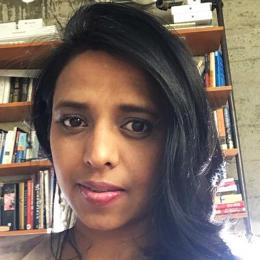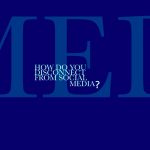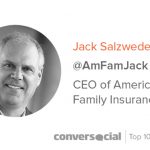Former Googler Aims To Create A New Hate-Free Social Media Site
Former Google engineer Bindu Reddy has spent years thinking about how people engage on the web. From 2005 to 2008, she worked on the early versions of Google+ as well as the web publishing network Blogger. In the years since, she’s launched a management system for helping social influencers monetize their big followings called Mylikes. Now Reddy has a bigger, more ambitious goal in sight: building an anonymous social network without hate speech, abuse, or power-wielding superusers. She’s enlisting the help of former Reddit CEO Yishan Wong to help her do it.

Anonymous social feeds are of course not a new concept. Anonymous social apps were the friendship bracelets of the early 2010s: hastily strung together in the early summer months, worn by everyone at the season’s peak, and discarded in the first week of school. People flocked to the app to read surreptitious posts, but the content proved to be a lackluster stream of the kind of inner thoughts no one really wants to know about. From 2010 to 2014, mobile apps like Secret, Whisper, and YikYak raised tens of millions of dollars for their ability to appeal to high school and college students. Since then, the novelty has worn off. Secret has shut down and YikYak is reportedly in financial turmoil.
But Reddy is hoping to take a different approach this time. “What we think is missing in this space is a place for someone to be your personalized newsfeed with information actually being shared in an unfiltered way,” says Reddy. More specifically, Reddy is trying to foster a platform where people don’t just yell random thoughts into a streaming abyss of opinions, but rather share information and have honest discussions with one another on chosen subject matter.
The idea first came shortly after Reddy wrote an op-ed for the tech blog TechCrunch that dismissed the notion that any company should hire women for the sake of hiring women. The lack of minority and female employees working at Silicon Valley giants was on the precipice of becoming an issue that couldn’t be ignored. The article was met with backlash, both within her own trusted circle and outside of it.
“It just felt like I shouldn’t have made that post, in retrospect,” says Reddy. It wasn’t just the response from her colleagues that was mortifying. It was when Facebook COO Sheryl Sandberg reacted to the article that she realized that airing her opinions in public could affect her career. Furthermore, since having many discussions about her written opinion, Reddy has changed her mind. The article she wrote, which will live on indefinitely on the web, both on the site where it was originally published and beyond, no longer reflects what she actually thinks.

Many people air their opinions on Facebook in posts that have an equally long shelf life. Users are of course not necessarily unwise to the visibility of their behaviors on these platforms. Neither are researchers. Social scientists, psychologists, and others have spent a good chunk of time picking apart the way we act on online social forums. The conclusion is often that social media feeds the ego and our need to present ourselves in a certain light—a soft light that allows us to put our best selfie forward; our most promising versions of ourselves.
Related: The Psychology Behind Why You Overshare On Slack
It’s this tendency that Reddy thinks is bad for public discussion. “You go to Facebook and you see stuff from everybody being shared,” she says. “But the problem with that is it’s stuff your friends think they’re supposed to share and less about actually what they want to share.” We’re not having authentic conversations on the web anymore, she asserts, because we’re too busy promoting the avatar we’ve created for ourselves. But on an anonymous platform, we could truly be free to say whatever we want.
Being free to say whatever you want, though nice in concept, isn’t always so glorious. As web trolls have illustrated time and again, the freedom to speak can yield bigotry, abuse, and ultimately silencing of minority opinions—quite the opposite of what Reddy has in mind. However, Wong thinks that unfiltered opinions themselves aren’t the problem, so much as the platform’s ability to set the tone.

“While most people like to think there are specific bad people to exclude, it’s really about setting up structures and norms to incentivize the behavior you prefer,” says Wong.
Reddy promises her app, which will be announced later this week, will create a space for discussion without all the performative social behaviors Facebook and Twitter encourage or the kind of Lord of the Flies groupthink that an anonymous platform like Reddit produces. She intends to do that through three key mechanisms: moderating abusive commentary; restricting all conversations to specific topic threads; and preventing people from creating a lasting anonymous persona.
To moderate comments, Reddy is employing sentiment-detecting machine learning to weed out both personalized affronts and generalized hate speech. Users will also be able to report offensive content. But where Reddy really thinks her app is different is in the way it anonymizes users. Users get a new avatar every time they log on. Reddy believes that having a platform on which users have one persistent alias provides super-users with the opportunity to build up social equity and build alliances to silence other members. If a user is forced to essentially be a different person every time they log on, they can’t build up that same sway.
What anonymity will provide here is a release from social pressure. Reddy doesn’t want anyone to be afraid to ask a question or voice a dissenting opinion, but anonymity also takes away accountability. What is yet to be seen is whether people want a social platform where they can neither push a particular image of themselves nor form lasting relationships.
related video: How to lead a purposeful company towards positive change
Fast Company , Read Full Story
(9)













